2018 Seminars
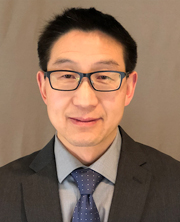
Zhengqiang Wang, PhD
Title: Medicinal Chemistry toward a Hepatitis B Virus Cure
February 21, 2018

Denis Liotta, PhD
Title: Novel Therapeutics for Treating Viral Diseases, Cancers and Inflammatory Disorders
Prof Liotta's lab has discovered a series of CXCR4 modulators that, depending on their binding orientations, can act as either potent antagonists or inverse agonists of CXCR4 cell surface receptors. In addition, they have discovered a series of dual tropic antagonists with excellent safety profiles that simultaneously block HIV entry through both CXCR4 and CCR5. In this presentation Prof Liotta will discuss some of the opportunities and challenges associated with the development of these series.
April 18, 2018
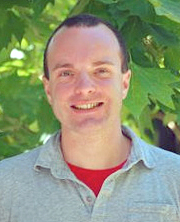
Patrick Rothwell, PhD
Title: Identifying and Correcting Brain Circuit Dysfunction Associated with Autism
Using transgenic mice carrying autism-associated genetic mutations, Prof Rothwell's group has identified a very selective impairment of inhibitory synaptic transmission onto a genetically and anatomically defined brain cell type. This impairment of synaptic transmission causes specific forms of repetitive behavior in mice, which may be relevant to autism in humans. They are actively developing a novel pharmacotherapeutic strategy to compensate for the effects of these autism-associated genetic mutations, which may restore the normal function of brain circuits.
May 16, 2018
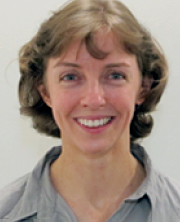
Kerry McPhail, PhD
Title: Targeting Inhibitors of Protein Secretion from Microbial Communities
October 17, 2018
2017 Seminars
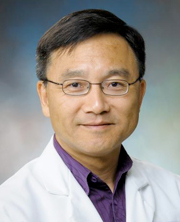
Pei-Yong Shi, PhD
Title: Flavivirus Antiviral and Vaccine Development
The Shi lab integrates both academic and industrial expertise for basic and translational research. Their research focuses on flaviviruses that cause significant human diseases, such as dengue, Zika, West Nile, and Japanese encephalitis viruses. Despite their global public health burden, there is no clinically approved therapy for flavivirus infection. To address this huge unmet medical need, they take a multidisciplinary approach (i) to study the molecular mechanism of viral replication and (ii) to translate the knowledge into antiviral, vaccine, and diagnostic products.
April 19, 2017
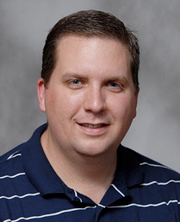
Daniel Harki, PhD
Title: Modulation of Transcription Factor Signaling with Covalent Small Molecule Inhibitors
Transcription factors (TFs) are DNA-binding proteins that modulate the transfer of genomic information to mRNA (and ultimately proteins) in cells. Aberrant TF activity causes many human diseases, such as chromic inflammation (elevated NF-kB signaling) and prostate cancer (elevated androgen receptor signaling), among others. Over 1000 TFs are believed to be encoded in the human genome, but only a fraction of TFs have been annotated for structure and function. Despite their central roles in human disease, TF-modulating drugs are largely unrealized due to challenges associated with developing TF-binding molecules. Our group has developed chemical modulators of NF-kB (p50/p65) signaling that (i) covalently engage upstream kinases that activate the p50/p65 heterodimer for transcription, (ii) directly target p65 and block the ability of the p50/p65 heterodimer to bind DNA, and (iii) mimic the endogenous DNA binding site of the p50/p65 heterodimer and sequester it. The development of these unique NF-kB modulators, our efforts to develop next-generation compounds, and thoughts on their potential applications will be presented.
May 3, 2017
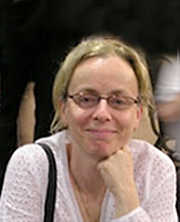
Ravit Boger, PhD
Title: Drug Development for Cytomegalovirus
Dr. Ravit Boger is an associate professor of pediatrics and oncology at the Johns Hopkins University School of Medicine. Her area of clinical expertise is pediatric infectious diseases. She is known for her research on congenital cytomegalovirus (CMV) infection. Her lab was among the first in this country to characterize CMV genes, and they recently identified a protein that regulates the body's immune response to CMV.
The main themes of Boger group's research include:
CMV INHIBITION BY ARTEMISININ-DERIVED DIMERS: Boger group has shown that artemisinin-derived dimers inhibit human CMV replication significantly more that artemsinin-derived monomers, a pattern that has been observed in inhibition of cancer cell lines. Current work focuses in identifying mechanisms of CMV inhibition by these compounds and their effects on cell-signaling pathways.
MODELS OF ANTI-VIRAL COMBINATION THERAPY: Boger group has performed extensive analysis of CMV inhibition using combination of known CMV inhibitors. Using several models for analysis of drug combination they have shown that the slope parameter is an important factor in distinguishing between classes of CMV inhibitors and for analyzing the outcome of drug combination.
ROLE OF WNT PATHWAY IN CMV REPLICATION: Prof. Boger and coworkers have shown that in contrast to other herpesviruses (such as EBV and KSHV) CMV infection of human foreskin fibroblasts results in inhibition of the WNT pathway.
CMV CONTROL BY NOD1 AND NOD2: Boger group has shown that NOD1 and NOD2 recognize CMV and restrict virus replication. They are studying mechanisms of CMV control by NOD1 and NOD2, and the effects of their polymorphisms on virus replication.
May 17, 2017
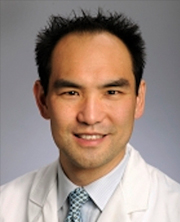
David Yu, MD, PhD
Title: Elucidating and Exploiting SIRT2 and SAMHD1 in the DNA Damage Response
The SIRT2 sirtuin deacetylase and tumor suppressor proteins directs the replication stress response and more generally DNA damage response and is a novel target for cancer therapy. SAMHD1 is a dNTP triphosphohyrodylase that is well-established in restricting HIV-1 infection but also has a novel dNTPase indepedent function in directing DNA double-strand break repair by homologous recombination through DNA end resection, which may be exploited for cancer therapy.
July 20, 2017
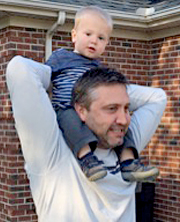
Christian Melander, PhD
Title: Using Nitrogen Dense Marine Alkaloids as a Platform for the Discovery of New Antibiotic Adjuvants
November 15, 2017
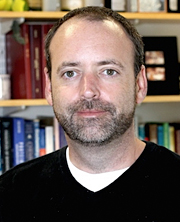
Paul Thompson, PhD
Title: Chemical Probes targeting the Protein Arginine Deiminases.
The Protein Arginine Deiminases (PADs) hydrolyze arginine residues to form citrulline. This post-translational modification is upregulated in numerous cancers and autoimmune disorders including RA, lupus, and Alzheimer’s disease. While these enzymes are important regulators of gene transcription, the full spectrum of biological activities is relatively underexplored. Prof Thompson will discuss his group's efforts to develop chemical probes targeting the PADs and protein citrullination, focusing on their success in developing cell permeable activity-based proteomic profiling reagents for the PADs as well as their efforts to characterize the citrullinome with their phenylglyoxal based reagents – these latter reagents can be used to readily visualize and isolate citrullinated proteins.
December 20, 2017
2016 Seminars
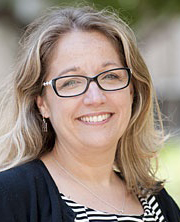
Kathlynn Brown, PhD
Title: The Hunt for Cancer Targeting Peptides: New Ligands for Precision Therapy of Lung Cancer
Dr. Brown's research team is developing peptides that target tumors for use as delivery vehicles for drugs, nanoparticles, and toxins. They are also utilizing the peptides to develop novel immunotherapies to fight cancer. Additionally, the peptides are being utilized as molecular imaging agents for diagnosis and classification of cancers.
February 17, 2016
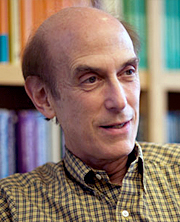
Stephen J. Lippard, PhD
Research in Professor Lippard's laboratory involves bioinorganic chemistry. The core activities include both structural and mechanistic studies of macromolecules as well as synthetic inorganic chemistry. The focus is on the synthesis, reactions, physical and structural properties of metal complexes as models for the active sites of metalloproteins and as anti-cancer drugs. Also included is extensive structural and mechanistic work on the natural systems themselves. A program in metalloneurochemistry is also in place.
April 19, 2016
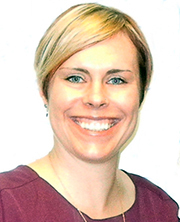
Erin E. Carlson, PhD
Title: Chemical Probes for Histidine Kinase Protein Profiling and Inhibitor Discovery
The Carlson Group unites tools from chemistry and biology to promote the development and application of technologies that will contribute to the understanding of new strategies for treatment of bacterial infections and the discovery of efficacious compounds. Three complementary research directions are being pursued: (i) Protein Function – design and application of chemical probes for characterization of bacterial cell wall biosynthesis (ii) Target Exploration – generation of methods for the investigation and inhibition of histidine kinases (iii) Molecule Discovery – development of strategies to dramatically expand our ability to explore natural product chemical space.
May 18, 2016

William H. Frey II, PhD
Dr. William H. Frey II is the Founder and Co-Director of the Alzheimer's Research Center at Regions Hospital, Professor of Pharmaceutics and faculty member in Neurology, Oral Biology and Neuroscience at the University of Minnesota and consultant to the pharmaceutical and biotechnology industry. The intranasal insulin treatment he developed for Alzheimer’s disease has been shown in multiple clinical trials to improve memory in both Alzheimer’s patients and normal adults. The intranasal therapeutic (stem) cell treatment he discovered has been shown to bypass the blood-brain barrier to treat Parkinson's, stroke, neonatal ischemia, multiple sclerosis and subarachnoid hemorrhage in animal models of these disorders.
Read a recent Neurology Reviews cover story written by their editor entitled: Intranasal Drug Delivery Bypasses the Blood-Brain Barrier which describes intranasal treatments based on Dr. Frey's discoveries using drugs, peptides, biologics and therapeutic stem cells for Alzheimer's, Parkinson's, MS, brain tumors, stroke, traumatic brain injury and other brain disorders: Click Here
October 19, 2016
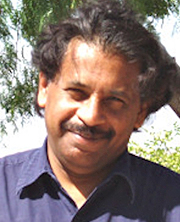
Siddhartha Das, PhD
Title: Encystation by Giardia: stories told by sphingolipids and lipid rafts
Dr. Das' laboratory investigates the lipid metabolism and lipid signaling in parasitic protozoan, Giardia lamblia. He is also interested in identifying the role of arachidonic acid (present in high fat diet) in inducing inflammatory reactions in breast cancer. Currently, he is the director of Immunology and Infectious Disease Cluster of the Border Biomedical Research Center (BBRC) at the University of Texas at El Paso, which is supported by a grant from the NIH.
November 16, 2016
2015 Seminars
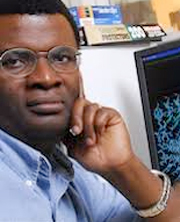
Adegboyega K. Oyelere, PhD
Associate Professor
School of Chemistry & Biochemistry
Georgia Institute of Technology
The overarching research objective of Prof Oyelere's laboratory is to delineate the chemical basis of the molecular recognition events employed by biomolecules to drive important biological processes. They are interested in how perturbation of molecular recognition, by natural and synthetic ligands, can be used to understand the molecular basis of biological processes. Read More
January 21, 2015
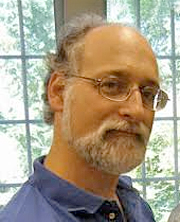
Adam Zlotnik, PhD
Professor
Molecular and Cellular Biochemistry Department
Indiana University
February 24, 2015

Daniel Zurawski, PhD
Senior Scientist/Principal Investigator
Cell and Molecular Biology
Walter Reed Army Institute of Research
April 15, 2015
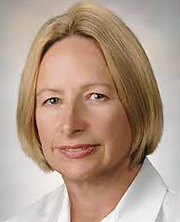
Susan Mooberry, PhD
Professor of Pharmacology and Co-leader of Experimental & Developmental Therapeutics
Cancer Therapy & Research Center
The University of Texas Health Science Center at San Antonio
May 20, 2015
Christopher McCurdy, Ph.D. B.S.Ph, FAAPS
Professor
College of Pharmacy
University of Florida
September 16, 2015
Title: Protein Quality Control and Cancer Therapy
To safeguard proteomic integrity, eukaryotic cells rely on the ubiquitin proteasome system to degrade aberrant polypeptides and the autophagy pathway to eliminate protein aggregates. Inhibition of these protein quality control (PQC) systems in cells leads to unbalanced protein homeostasis (proteostasis) network, which culminates in cell death. Many types of cancer cells are particularly sensitive to perturbed proteostasis network given their strong reliance on protein synthesis for growth. As a result, targeting PQC pathways has been demonstrated to be an effective therapeutics for certain types of cancer. The presentation will discuss the mechanism of endoplasmic reticulum-associated degradation (ERAD), a PQC mechanism that degrades misfolded ER proteins, and the possibility of targeting key ERAD regulators in cancer therapy. A novel PQC pathway that might be a potential anti-cancer target will also be discussed.
October 21, 2015
Title: 'Probing the Reaction Mechanism of Metallo-b-lactamases'
Prof. Crowder’s research involves the study of two medically-important enzymes, metallo-b-lactamases (MBLs) and matrix metalloproteinases (MMPs). His lab utilizes pre-steady state kinetic studies to probe the kinetic mechanisms of these enzymes and spectroscopic and crystallographic studies to probe the structures of these enzymes. They utilize rapid freeze quench methods to trap reaction intermediates and EPR/EXAFS spectroscopies to characterize these intermediates.
November 18, 2015
Title: Single Electron Transformations to Enable Cross-Couplings
The central theme of the Molander group's research is the development of new synthetic methods and their application to the synthesis of organic molecules. The group's focus is to expand and improve the Suzuki coupling reaction for organoboron compounds. Robust, air- and water-stable potassium organotrifluoroborates (R-BF3K), are employed to carry out couplings under relatively mild conditions using non-toxic components.
December 16, 2015
2014 Seminars
Susan Horowitz, PhD
May 21, 2014, Moos 2-530
Distinguished Professor & Co-Chair, Dept of Molecular Pharmacology
Rose C. Falkenstein Chair in Cancer Research, Albert Einstein College of Medicine, New York
Title: Taxol®, Tubulin and Tumors: A Fascinating Story of Drug Development
Barbara A. Gilchrest, MD
Apr 23, 2014, Moos Tower 2-650
Chair Emeritus and Professor of Dermatology
Boston University School of Medicine
Title: Harnessing an Innate DNA Damage Pathway to Prevent and Treat Cancer
Hasan Mukhtar, PhD
March 19, 2014, Mayo Auditorium
Professor, Department of Dermatology
School of Medicine and Public Health, University of Wisconsin
Title: Delphinidin, A Dietary Anthocyanidin for Treatment of Psoriasis
Michael Lee, PhD
Feb 19, 2014
Professor, Department of Neuroscience
Co-Director and ITN Scholar, Center for Neurodegenerative Disease, Institute for Translational Neuroscience
Title: Neurodegeneration in Mouse Models of Alzheimer's and Parkinson's Disease: Relevance to Therapy Development
Lin Zhang, PhD
Jan 15, 2014, Mayo 3-125
Associate Professor
Department of Pharmacology and Chemical Biology
University of Pittsburgh, Pittsburgh, PA
Title: Role of PUMA-Mediated Apoptosis in Anticancer Therapies
2013 Seminars
Michael Barbachyn, PhD
Professor, Department of Chemistry and Biochemistry
Calvin College, Grand Rapids, MI
Title: Oxazolidinone Antibacterial Agents: Progress and Prospects
Dec 18, 2013, Moos Tower 2-530
Jodi L. Johnson, PhD
Departments of Pathology and Dermatology
Northwestern University Feinberg School of Medicine
Title: Targeting DNA Damage Repair or Epidermal Differentiation Pathways for Prevention of Skin Cancer
Nov 22, 2013, Moos 2-690
Megan Shaw, PhD
Associate Professor, Microbiology
Mount Sinai Hospital, New York
Title: Exploring Novel Targets for Influenza Antivirals
Nov 20, 2013, Moos 2-620
Daniel Quinn, PhD
Professor, Department of Chemistry
University of Iowa
Sep 18, 2013, Mayo Auditorium
A. Douglas Kinghorn, PhD, DSc
Jack L. Beal Professor and Chair,
Medicinal Chemistry and Pharmacognosy
The Ohio State University
Title: Contemporary Prospects of Drug Discovery from Higher Plants
Title: The Quest to Resurrect Aged Acetylcholinesterase
Mar 20, 2013, Moos 2-690
Jeff Krise, PhD
Associate Professor
Department of Pharmaceutical Chemistry
The University of Kansas
Title: The sequestration of drugs in Lysosome: Mechanisms and Therapeutic Consequences
Feb 20, 2013, Mayo Auditorium
Ming Luo, PhD
Professor, Associate Director
Center for Biophysical Sciences and Engg.
The University of Alabama at Birmingham
Title: Discovery of Novel Inhibitors of Influenza
Jan 16, 2013, Mayo 3-125
Priscilla Yang, PhD
Associate Professor
Department of Microbiology and Immunobiology
Harvard Medical School
Title: Chemical Approaches to the Study of Human Viruses
April 17, 2013, Moos 2-530